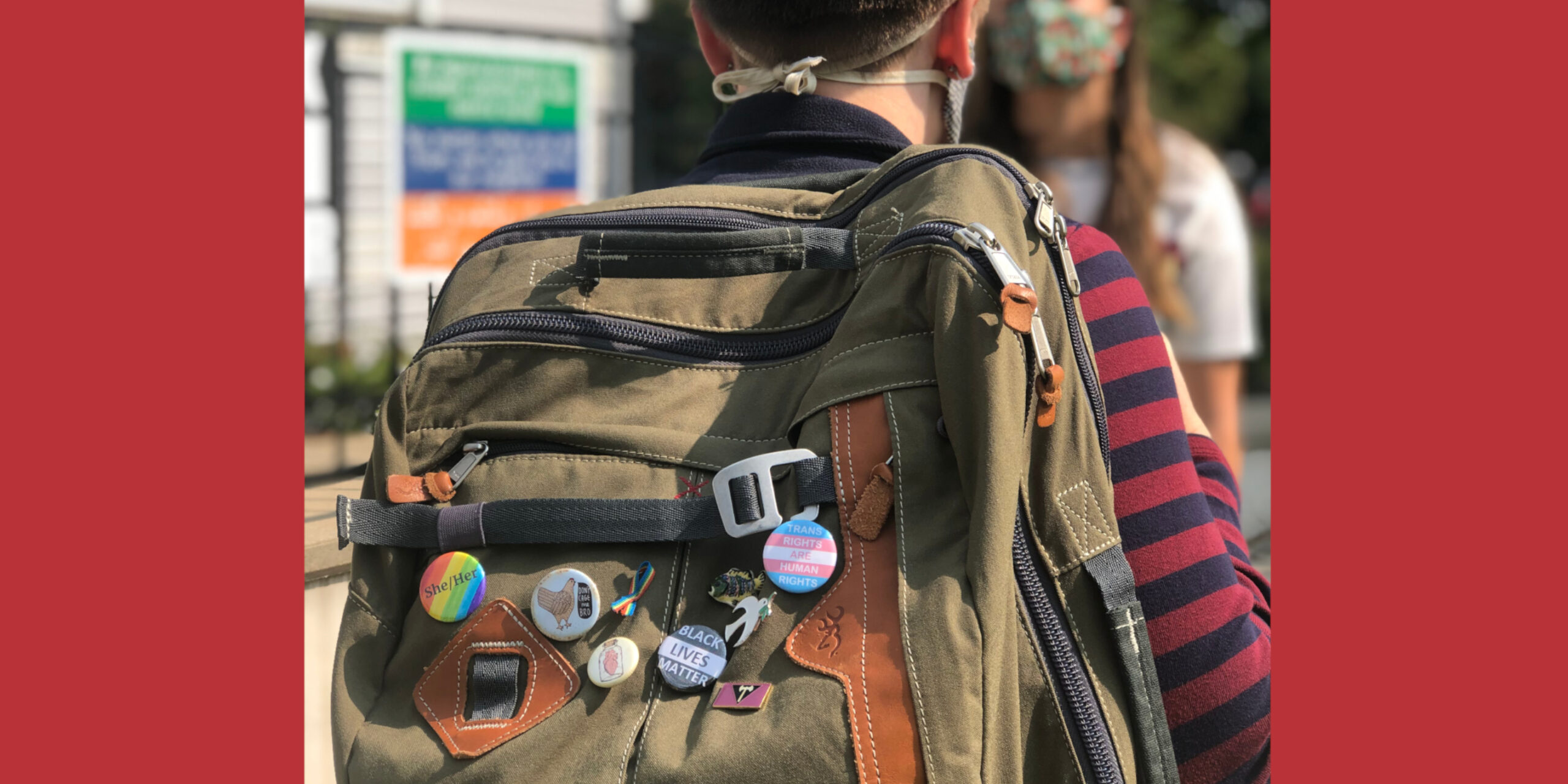Colorful pronoun buttons may be the next accessory to spread across the GC campus.
The coin-shaped buttons are designed to pin to a backpack. They’re custom-made with your pronouns and color of choice and are currently being sold by the campus LGBTQ Advocacy club, Advocates, as a way to bring awareness to gender language issues on campus.“We want people to be confident in sharing their pronouns,” said Elizabeth Reimer, who co-leads Advocates along with Josie Strader.
“I don’t know if everyone would necessarily need to put them on their backpack,” Strader added, “But that’s just an easy, convenient way not to have to tell people all the time.”
Elizabeth Reimer, a junior Bible and religion and PJCS double major, and Josie Strader, a junior environmental science and music double major, are co-leading the Advocacy club under the advisorship of Joanne Gallardo, the campus pastor.
In past years, the club has organized Safe Zone trainings, movie nights and self-care events. It was also involved in updating the the college’s discrimination policy in 2015 to welcome LGBTQ proffesors. But this year, COVID-19 regulations make it difficult to plan events.
“Buttons are a good creative way to do no-contact but still make sure people are aware of us,” Reimer said.
The mission of the Advocacy club is to educate and promote open lines of communication between LGBTQ and straight students, faculty and communities on campus.
Reimer is especially passionate about education.
“We have students coming on campus who have not had a lot of contact with LGBTQ people before,” she said. “So helping them learn about our community in a way that is productive and helpful is really important to me.”
Learning to identify and use pronouns mindfully is something everyone can do to build a more respectful community.
In the English language, pronouns have traditionally been linked to gender. Recently, awareness around gender diversity has spurred the search for gender-neutral pronouns.
In 2017, the AP stylebook officially recognized “they” as a gender-neutral singular pronoun. And last September, the Merriam Webster dictionary added “they” as a pronoun specific for people whose gender is non-binary.
Reimer emphasized that the purpose of sharing pronouns is to make communication more respectful.
“Just sharing your pronouns doesn’t mean that you are trans (your gender is different than your birth sex) or cis (your gender and birth sex are the same) or anything like that,” she said, “It’s just pronouns.”
Strader believes the goal is for everyone to introduce themselves with their pronouns, so that way no one will be misgendered.
“It’s like introducing yourself with your name, or your name and major,” Reimer said. “It changes your awareness of what pronouns you are using, and nothing else about your interaction with the person, right? Because what pronouns you use shouldn’t change how you interact with a person.”
Strader came up with the idea of making pronoun buttons her first year at Goshen College, when she saw a few people wearing them. “That would be a cool thing to make more common on campus,” she remembers thinking.
Strader personally crafts every button herself with the use of a button-making machine she bought off of eBay. After printing the label and assembling the five or six parts that make up each button, it only takes her about a minute to punch it all together.
The buttons, which can be ordered for $1 using the order form linked in the Communicator, come in 10 different themes: “every color of the rainbow –and rainbow,” Reimer said.
Besides wearing your pronouns on your backpack, Strader and Reimer suggested other ways pronouns can be shared. They can be added to your email sign-off, twitter bio or dorm door.
Strader said she always puts her pronouns on her nametag at events.
Some professors at Goshen College have added prefered pronouns to the list of introductory questions they ask students on the first day of class.
Kieth Graber Miller, professor of Bible, religion and philosophy, started doing this in his sexuality classes five or six years ago and now does it in all his classes.
Graber Miller is grateful to students who have helped him navigate the shifting “gender and sexuality landscape” in recent years.
“I want to teach and relate to others in ways that have integrity and that honor who people are,” he said. “I believe students have helped me do that.”
Ann Hostetler, who retired last year after 22 years in the English department, remembers when “they” became accepted as a singular, gender-neutral pronoun.
“Being an English teacher,” Hostetler explained, “there is always that un-grammatical thing of using the plural for the singular, but I don’t think we have a better solution, so I’ve embraced it.”
Despite the drawbacks to using the word ‘they,’ Hostetler predicts that it will outlast other novel pronouns like ze or xe.
“It’s really hard for invented words to stay in the language,” she said, “Unless the need is continually felt by lots of people. The thing about using the plural is that we already all have it.”
An announcement about the fundraiser ran in the Communicator last Thursday as well as Monday, Tuesday and Wednesday this week. By Monday, Sept. 21, Strader had already received 60 orders.
“Something that’s surprising is I was envisioning it as only students,” Strader said, “But there are staff and professors and faculty members that have also signed up for pins. It’s cool for me to see the diverse people who have ordered them.”




